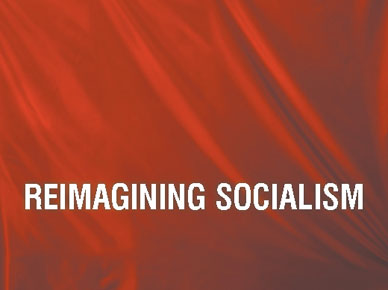 AVENGING ANGELS
AVENGING ANGELS
Socialism’s all the rage. “We Are All Socialists Now,” Newsweek declares. As the right wing tells it, we’re already living in the U.S.S.A. But what do self-identified socialists (and their progressive friends) have to say about the global economic crisis? In the March 4, 2009, issue, we published Barbara Ehrenreich and Bill Fletcher Jr.’s “Rising to the Occasion” as the opening essay in a forum on “Reimagining Socialism.” TheNation.com will feature new replies to their essay over the coming weeks, fostering what we hope will be a spirited dialogue.
A few weeks after taking office, Steven Chu, Obama’s Nobel Prize-winning energy secretary, gave his first interview, with the Los Angeles Times. The reporter asked him about climate change. “I don’t think the American public has gripped in its gut what could happen,” he said, describing the computer models that showed the snowpack in the Sierra Nevada would melt ever faster in the years ahead. Should that happen, he said, “We’re looking at a scenario where there’s no more agriculture in California.” And he added, “I don’t actually see how they can keep their cities going” either. Well.
In Barbara Ehrenreich and Bill Fletcher’s very fine essay, the most important section is about what has changed: first, the economic carnage all around us, but second–even more important–the wave of environmental destruction crashing over our heads. I’m definitely not a laissez-faire, Ayn Rand, libertarian capitalist. (Is anyone anymore? Alan Greenspan is calling for nationalizing the banks.) But I’m not sure I’m much of a socialist either, because both those faiths seem to me rooted in an earlier moment–a moment when we had some margin. A moment when the problem was growth and how best to make it happen and share its fruits.
That’s not our problem anymore. Our problem is how to deal with a crisis that will define our world for the foreseeable future. In November the International Energy Agency announced that all its earlier rosy forecasts about oil supplies were wrong–in fact, the world’s oilfields are facing “natural declines” in yield of about 7 percent a year. The fuel for free-market fundamentalism and Marxism was fossil fuel, and we’re not going to have it. (Or to the extent we do, and that extent would be coal, we’re not going to be able to burn it without triggering even more climate chaos.) The atmosphere that birthed all our ideologies held about 275 parts per million CO2. Now that number is 387 parts per million, which is why the Arctic is melting. Our foremost climatologists tell us that the chief goal of any politics for the twenty-first century has to be getting that number back down below 350, because the current elevated levels are “simply not compatible with keeping a planet similar to the one on which civilization developed.” All that is frozen melts into the sea, or something like that.
Popular
"swipe left below to view more authors"Swipe →That world is necessarily going to be tougher. We will have to focus on essentials, like food and energy, far harder than in the past. I think we’ll need to find our livelihoods more locally, reducing the inherent vulnerabilities that go with a heavily globalized economy. At the moment less than 1 percent of America works on the farm–that’s a number that must rise. To the extent that government can help, it will be by pushing us away from the fossil fuel that underwrites our danger: a stiff cap on carbon will make the transition we require happen more quickly, though it will be tough to endure.
In fact, the only way to endure the transition will be with a renewed sense of community. The real poison of the past few decades has been the hyper-individualism that we’ve let dominate our political life–the idea that everything works best if we think not a whit about the common interest. In the end, that has damaged our society, our climate and our private lives. The first and final hope we have is a resurgence of a politics that calls on us to work together. We saw glimpses of it in the Obama campaign, which was at least as interesting as the man himself. I hope we’ll see many more such glimpses in the years ahead.
Other Contributions to the Forum
Immanuel Wallerstein, “Follow Brazil’s Example”
Rebecca Solnit, “The Revolution Has Already Occurred”
Tariq Ali, “Capitalism’s Deadly Logic”
Robert Pollin, “Be Utopian: Demand the Realistic”
John Bellamy Foster, “Economy, Ecology, Empire”
Christian Parenti, “Limits and Horizons”
Doug Henwood, “A Post-Capitalist Future is Possible”
Mike Davis, “The Necessary Eloquence of Protest”
Lisa Duggan, “Imagine Otherwise”
Vijay Prashad, “The Dragons, Their Dragoons”
Kim Moody, “Socialists Need to Be Where the Struggle Is“
Saskia Sassen, “An Economic Platform That Is Ours“
Dan La Botz, “Militant Minorities”
Michael Albert, “Taking Up the Task”
Dave Zirin, “Socialists, Out and Proud”
Joanne Landy, “I Love Bill Moyers, but He’s Wrong About Socialism”
Hilary Wainwright, “I Love Bill Moyers, but He’s Wrong About Socialism”
George A. Papandreou, “The Challenge of Global Governance”


